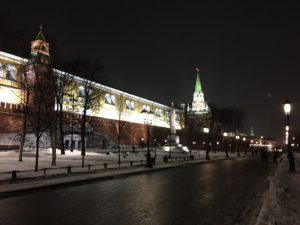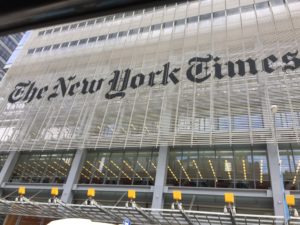
IPFS News Link • Trump Administration
Blaming Russia for the Internet 'Sewer'
• Constorium newsExclusive: As the Russia-gate hysteria spirals down from the implausible to the absurd, almost every bad thing is blamed on the Russians, even how they turned the previously pristine Internet into a "sewer," reports Robert Parry.
By Robert Parry
With the U.S. government offering tens of millions of dollars to combat Russian "propaganda and disinformation," it's perhaps not surprising that we see "researchers" such as Jonathan Albright of the Tow Center for Digital Journalism at Columbia University making the absurd accusation that the Russians have "basically turned [the Internet] into a sewer."
Tomb of the Unknown Soldier outside the Kremlin wall in Moscow, Dec. 6, 2016. (Photo by Robert Parry)
I've been operating on the Internet since 1995 and I can assure you that the Internet has always been "a sewer" — in that it has been home to crazy conspiracy theories, ugly personal insults, click-bait tabloid "news," and pretty much every vile prejudice you can think of. Whatever some Russians may or may not have done in buying $100,000 in ads on Facebook (compared to its $27 billion in annual revenue) or opening 201 Twitter accounts (out of Twitter's 328 million monthly users), the Russians are not responsible for the sewage coursing through the Internet.
Americans, Europeans, Asians, Africans and pretty much every other segment of the world's population didn't need Russian help to turn the Internet into an informational "sewer." But, of course, fairness and proportionality have no place in today's Russia-gate frenzy.
After all, your "non-governmental organization" or your scholarly "think tank" is not likely to get a piece of the $160 million that the U.S. government authorized last December to counter primarily Russian "propaganda and disinformation" if you explain that the Russians are at most responsible for a tiny trickle of "sewage" compared to the vast rivers of "sewage" coming from many other sources.
If you put the Russia-gate controversy in context, you also are not likely to have your "research" cited by The Washington Post as Albright did on Thursday because he supposedly found some links at the home-décor/fashion site Pinterest to a few articles that derived from a few of the 470 Facebook accounts and pages that Facebook suspects of having a link to Russia and shut them down. (To put that 470 number into perspective, Facebook has about two billion monthly users.)
Albright's full quote about the Russians allegedly exploiting various social media platforms on the Internet was: "They've gone to every possible medium and basically turned it into a sewer."
But let's look at the facts. According to Facebook, the suspected "Russian-linked" accounts purchased $100,000 in ads from 2015 to 2017 (compared to Facebook's annual revenue of about $27 billion), with only 44 percent of those ads appearing before the 2016 election and many having little or nothing to do with politics, which is curious if the Kremlin's goal was to help elect Donald Trump and defeat Hillary Clinton.
Even former Clinton political strategist Mark Penn has acknowledged the absurdity of thinking that such piddling amounts could have any impact on a $2.4 billion presidential campaign, plus all the billions of dollars worth of free-media attention to the conventions, debates, etc. Based on what's known about the Facebook ads, Penn calculated that "the actual electioneering [in battleground states] amounts to about $6,500."
In a Wall Street Journal op-ed on Monday, Penn added, "I have 40 years of experience in politics, and this Russian ad buy mostly after the election anyway, simply does not add up to a carefully targeted campaign to move voters. It takes tens of millions of dollars to deliver meaningful messages to the contested portion of the electorate."
Puppies and Pokemon
And, then there is the curious content. According to The New York Times, one of these "Russian-linked" Facebook groups was dedicated to photos of "adorable puppies." Of course, the Times tried hard to detect some sinister motive behind the "puppies" page.
The New York Times building in Manhattan. (Photo credit: Robert Parry)
Similarly, CNN went wild over its own "discovery" that one of the "Russian-linked" pages offered Amazon gift cards to people who found "Pokémon Go" sites near scenes where police shot unarmed black men — if you would name the Pokémon after the victims.



























